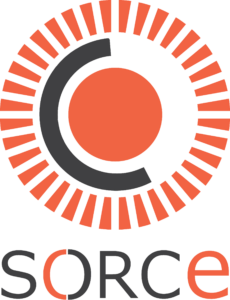50 Stories Part 45: A SORCe for the homeless
Image: On June 2, 2017, SORCe was honoured with a Community Justice Award from Alberta Justice and Solicitor General. The award recognizes excellence and innovation in community partnerships, in the areas of victims’ services, youth justice, restorative justice and other crime-prevention efforts.
In 2013, Distress Centre returned to its 1970 street-level roots by offering a walk-in only service for Calgary’s most vulnerable. Named SORCe (Safe Communities Opportunity and Resource Centre), it operates in partnership with a large number of related agencies. They collaborate out of a single downtown location to provide wrap-around supports to people who otherwise struggle with access to services and/or who have complex needs.

Dean Soenen, Director at partner agency Wood’s Homes, describes the relationship:
“We have done joint proposals for funding with DC. One in particular is SORCe, who partners with the Calgary Homeless Foundation, seniors’ organizations and others in the homeless sector. It is one stop shopping for information and referrals.
“Distress Centre is the largest contributor from a staffing perspective. Duane Gillissie is the Director of Programs overseeing Distress Centre programming, as well as managing SORCe programs and overall operations.”
Serving clients at SORCe
Two Client Engagement Specialists are the first point of contact for all visitors, and it is their job to build rapport, identify needs, and connect clients to services within or outside of SORCe. A team of five Housing Strategists develop individualized housing plans for clients experiencing, or are at risk of, homelessness. A Financial Empowerment program assists clients with completing taxes, assistance and advocacy for income support applications, and a variety of other services.
Duane speaks to his experiences:
“One way to think about DC’s programming at SORCe is as a combination of the 211 and crisis lines, but in person rather than on the phone. Distress Centre is interested in helping people resolve homelessness who are not going to pick up the phone, because they probably don’t have one. They will walk in the door if it is easy and accessible. A sign posted outside the building says to call Distress Centre after hours. We do not take phone calls at SORCe.
“SORCe was originated by the Calgary Police Service, and their objective was to reduce the number of front-line police interactions with people experiencing homelessness.

“We mostly work with people who have a history of chronic homelessness, who are newly homeless, or who are at risk of homelessness.
“In 2019, we had just over 17,000 in-person visits by 4,700 individuals. We work with many people who have been banned from one or more shelters, those who have had a bad experience, and those who choose to sleep outside. We are a neutral space that is not a shelter where people do come and hang out instead of being out on the streets. There is real value in that.
“We do not intend to be a crisis centre, but we do respond to crisis often. We are a harm reduction organization, so we interact with people who are using drugs or alcohol.
“Some clients can create challenges, so we do a lot of boundary setting. We just introduced a client behaviour policy. We don’t like to do it because we know for many people, we are the last stop. It is progressive policy, one day, one week, a month, 3 months. There is always a restitution and expectation meeting after. We want to keep people engaged with us.
“We are probably the riskiest of all of DC’s programs. But my staff know where they work and whom they are working with, so while there is a recognition of the safety concerns, they are really passionate about the work. Our first interactions are behind a counter that has glass.
[edgtf_blockquote text=””We are probably the riskiest of all of DC’s programs. But my staff know where they work and whom they are working with, so while there is a recognition of the safety concerns, they are really passionate about the work.” – Duane Gillissie” title_tag=”h2″ width=””]
“Clients know a police officer is on site and they know we are in a building that has a jail in it, but that does not seem to stop them from coming.
“We do not use volunteers for liability reasons. We bring in practicum students as part of the housing or client engagement team. We have a really good relationship with the criminal justice program.”
COVID-19
With COVID, SORCe had to very quickly adapt to not seeing clients in-person and instead working remotely. Closing the doors on March 16 had a significant impact on the ability to provide service. Duane explains:

“We switched to a phone-based service but for our clients that is not very useful. The people that are actively homeless were not reaching out so at the end of June, we kicked off an outreach program for our shelter workers so they can go out into the community, mostly downtown, and pick a few prime spots where clients would usually be. We hang out about 3 times a week and we set up a place outdoors and check on how they are doing and what they might need from us. They may need their assessment updated because their circumstances have changed during COVID. For example, we needed to place some people into a hotel until something more permanent could be found.
“Our team is also responsible for training other people and agencies that do housing work, and we set that up virtually. While our financial empowerment program has been suspended until we can see people in person, our staff is now working with the Basic Needs Fund program at Distress Centre.
[edgtf_blockquote text=””Our team is also responsible for training other people and agencies that do housing work, and we set that up virtually. While our financial empowerment program has been suspended until we can see people in person, our staff is now working with the Basic Needs Fund program at Distress Centre.” – Duane Gillissie” title_tag=”h2″ width=””]
“Our space has become quite unsafe for staff and clients so in May we formed a cross-agency committee to address these concerns. We approached EllisDon who are long time DC supporters, and they connected us to Frank Architecture who have drawn up plans that address our future needs.
“When we closed our doors in March, people started to congregate in the Plus 15 and bus shelters or CTrain stations. They had to close down Victoria Park and Erlton Stations, because our clients were causing trouble. There is always a bigger impact to removing services for vulnerable people.
“We are excited to get back into a new space in November as staff are worried about clients who have lost a lifeline that has existed for the last six years.”
